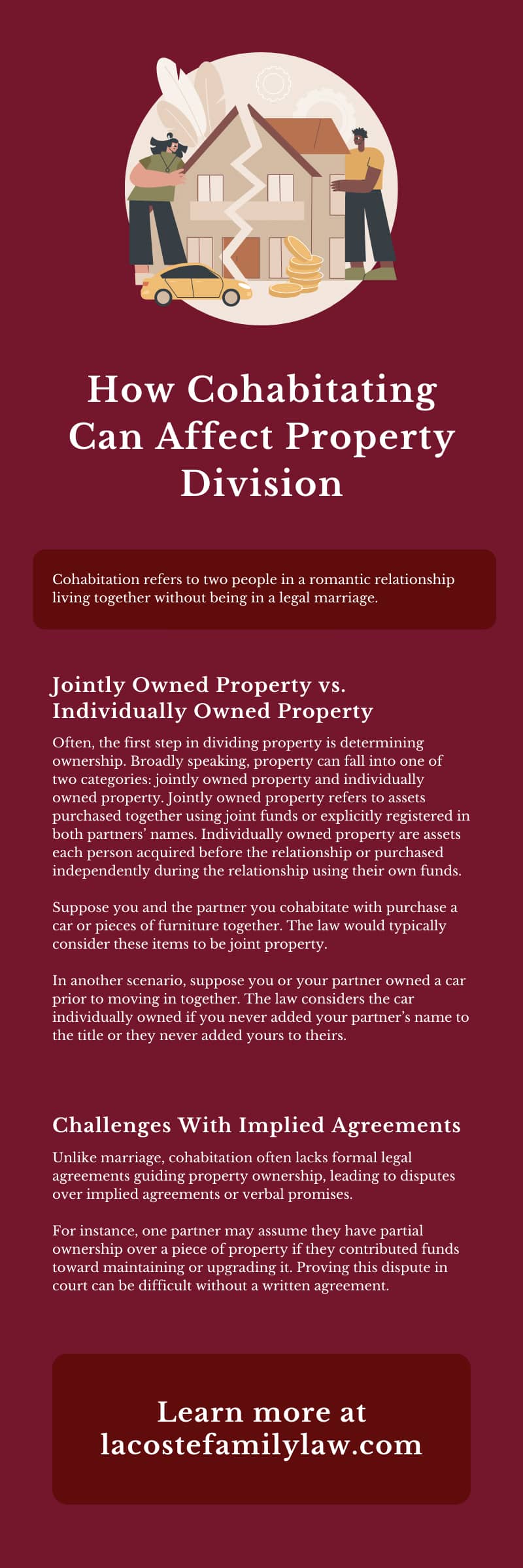
16 May How Cohabitating Can Affect Property Division
Cohabitation, or living together while unmarried, has become increasingly common. It offers many couples the benefits of sharing a household, splitting expenses, and testing compatibility without tying the knot.
Still, it can bring complexity when it comes to property division, especially when couples decide to part ways. Unlike married couples, cohabiting partners often lack clear legal protections and guidelines, leading to confusion and disputes.
Understanding how cohabitating can affect property division is a must for anyone entering this type of living arrangement. Examine the legal and financial aspects of property division.
Are you currently cohabitating or considering moving in together? In either scenario, you can avoid unnecessary conflicts with practical strategies and legal advice from a family law attorney.
What Is Cohabitation?
Cohabitation refers to two people in a romantic relationship living together without being in a legal marriage. This is modern arrangement is becoming common, as recent studies have demonstrated that the number of unmarried couples cohabitating has been steadily rising.
Cohabitation is attractive to some because it offers flexibility and freedom. Still, it also leaves room for ambiguity—particularly when it comes to dividing property if the relationship ends.
Why Does It Matter?
Family law statutes for married couples outline the ways to split assets in the event of divorce typically govern property division. These laws do not automatically apply to cohabitating partners.
Therefore, dividing property often becomes more complicated for unmarried parties. Understanding these distinctions is crucial for avoiding legal disputes and protecting your interests.
The Classification of Property in Cohabitating Relationships
One of the biggest challenges for cohabitating couples is determining how the law classifies their property and assets. Unlike married couples who benefit from clear community property or equitable distribution laws, cohabitating partners often face a less defined process.
Jointly Owned Property vs. Individually Owned Property
Often, the first step in dividing property is determining ownership. Broadly speaking, property can fall into one of two categories: jointly owned property and individually owned property. Jointly owned property refers to assets purchased together using joint funds or explicitly registered in both partners’ names. Individually owned property are assets each person acquired before the relationship or purchased independently during the relationship using their own funds.
Suppose you and the partner you cohabitate with purchase a car or pieces of furniture together. The law would typically consider these items to be joint property.
In another scenario, suppose you or your partner owned a car prior to moving in together. The law considers the car individually owned if you never added your partner’s name to the title or they never added yours to theirs.
Challenges With Implied Agreements
Unlike marriage, cohabitation often lacks formal legal agreements guiding property ownership, leading to disputes over implied agreements or verbal promises.
For instance, one partner may assume they have partial ownership over a piece of property if they contributed funds toward maintaining or upgrading it. Proving this dispute in court can be difficult without a written agreement.
Key Legal Considerations for Cohabitating Couples
Cohabitation laws significantly vary depending on the state you live in. Below are some critical legal considerations to keep in mind.
Cohabitation Agreements
A cohabitation agreement is a legally binding outline of each partner’s property rights and financial responsibilities. It can address various issues, such as:
- Ownership of jointly purchased items
- Contribution to household expenses or shared assets
- Division of property if the relationship ends
Creating a cohabitation agreement allows couples to clarify intentions, reducing the risk of disputes. Without a cohabitation agreement, courts may have to rely on default property laws—which may not align with your preferences.
“Common-Law Marriage” Misconceptions
Some couples believe that living together for a specific period automatically grants them the same legal rights as a married couple. However, “common-law marriages” only receive official recognition in a few states.
Plus, it typically requires clear evidence of intent to receive the same treatment as marriage. Examples include referring to each other as spouses or filing joint taxes.
For example, Washington state does not recognize common-law marriage unless the couple previously established one in a state that deems the process valid. Instead, Washington has a different doctrine.
Washington’s “Committed Intimate Relationships” Doctrine
Property division may fall under the “Committed Intimate Relationship” (CIR) doctrine for cohabitating couples in Washington. Previously known as “meretricious relationships,” CIR applies to unmarried couples in long-term, marriage-like relationships.
When couples establish a CIR, courts may divide property acquired during the relationship like community property laws. However, proving a CIR requires evidence of factors such as:
- The length of the relationship
- Shared finances or property
- Whether the couple lived together continuously
- The purpose of the relationship and whether it resembled a marriage
If the court recognizes a CIR, it can divide shared property equitably. However, this recognition only applies to property acquired during the relationship. Individually owned, pre-relationship assets remain separate.
Practical Steps To Protect Your Assets and Yourself
Cohabitating does not mean you have to leave yourself vulnerable. You can take several proactive steps to protect your assets and avoid disputes.
Draft a Cohabitation Agreement
Avoid the ambiguity about how cohabitating can affect property division. Draft an official cohabitation agreement. Like a prenuptial agreement for a legal marriage, a cohabitation agreement allows you to define the following:
- Ownership of specific assets
- Responsibility for shared expenses
- How you wish to divide property if the relationship ends
Navigating the legal complexities of cohabitation is not easy. However, you do not have to face it alone. Rely on an experienced lawyer who can give you legal advice relevant to your circumstances.
A property division attorney can help you ensure your cohabitation agreements and all other documents comply with state laws. LaCoste Family Law’s property division attorney will represent you and help you obtain the fair settlement you deserve. We will help you demonstrate rightful ownership of any assets entitled to you and uncover assets your ex might be concealing.
Keep Financial Records
Maintaining a clear paper trail is essential for protecting your interests. Detailed documentation can help an attorney assist you in avoiding countless hours of legal battles later. Make sure to do the following:
- Document significant purchases, including receipts and ownership proof.
- Avoid combining bank accounts without clear agreements.
- Keep records of any financial contributions made toward joint assets.
Regularly Reevaluate Agreements
Life circumstances evolve—people change jobs, purchase new property, or prioritize different goals. Periodically revisiting your cohabitation agreement ensures it reflects your current situation and intentions.
Plan To Live Stress-Free
While love and trust are the cornerstones of any relationship, it is worth remembering that clear communication and legal preparation can strengthen your bond. Cohabitation can be a rewarding arrangement that honors love and practicality when combined with legal safeguards.
Understanding the potential legal and financial implications is crucial, whether you are already cohabitating or considering making that leap. When you need guidance, turn to your local property division attorney. Practicing in several aspects of family law, they know how to offer clear, empathetic, and professional advice to protect your interests.


